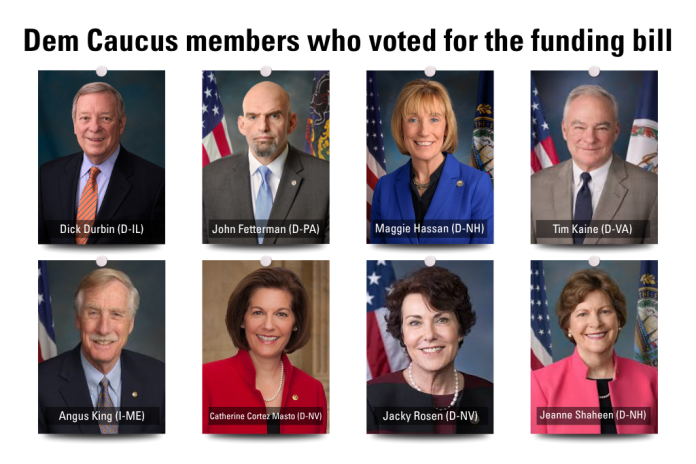The longest government shutdown in U.S. history is one step closer to coming to an end after the Senate passed short-term funding on Monday, the 41st day of the shutdown.
The measure, which passed 60-40 with bipartisan support, required a simple majority and now heads to the House for final passage, where it is expected to be approved as early as Wednesday.
“This has been a very long road, quite literally the longest shutdown in history,” Senate Majority Leader John Thune (R-SD) said. “I am very, very happy to be able to say that we are coming to the end.”
The legislation would fund the government through January 2026 and is the product of a bipartisan deal with eight senators in the Democratic Caucus, an agreement that fueled further divisions within the party over healthcare demands to extend expiring Obamacare subsidies.
In addition to the short-term funding extension, the deal’s framework included three appropriations bills to fund veterans affairs, agriculture, the legislative branch, and other federal departments. It also includes a Senate vote next month on a bill of Democrats’ choosing to extend expiring Obamacare subsidies that were the cause of the shutdown, an offer Republicans first floated one month ago but was rejected by Democrats.
President Donald Trump’s mass federal layoffs during the shutdown will also be reversed as part of the agreement, as well as language barring the administration from doing so again for the duration of the stopgap funding measure.
“There are Democrats and Republicans who are both interested in trying to do something in the healthcare space,” Senate Majority Leader John Thune (R-SD) said. “And clearly, there is a need.”
After 14 failed votes and 40 days into the shutdown, a breakthrough to advance the shutdown-ending deal came on Sunday, when the Senate overcame a filibuster after seven Democrats and one independent relented on their healthcare demands, providing Republicans with the required 60 votes. Those senators were Democratic Whip Dick Durbin (D-IL), John Fetterman (D-PA), Maggie Hassan (D-NH), Tim Kaine (D-VA), Catherine Cortez Masto (D-NV), Jacky Rosen (D-NV), Jeanne Shaheen (D-NH), and Angus King (I-ME).
Those same eight voted with Republicans on Monday to pass the measure. Sen. Rand Paul (R-KY) was the lone Republican to oppose it.

Durbin revealed Senate Minority Leader Chuck Schumer (D-NY), who opposed the agreement, gave “neither a blessing nor a curse” to vote for or against the legislation. Durbin went up to Thune on the floor Sunday evening during the first procedural vote to tell him “eight of us are sticking our neck out that you’re going to keep your word” on an Obamacare subsidies vote. Thune gave reassurance, according to Durbin.
“More and more people have said this has gone on way too long. We’ve proved our point,” Durbin said. “The Republicans are not sensitive to health insurance premiums, and we are. And the national polls show that we’ve made a national issue out of it, that if we have anything be proud of, I think that’s one of them.”
THE SENATE DEMOCRATS WHO VOTED WITH REPUBLICANS TO REOPEN THE GOVERNMENT
House lawmakers have an official 36-hour vote notice from the time of Senate passage. Speaker Mike Johnson (R-LA) declined Monday to guarantee a House vote on any Senate-passed legislation regarding Obamacare subsidies.
“We’re going to do in the House what we always do, and that is a deliberative process and find consensus on whatever their proposal is,” Johnson said.
